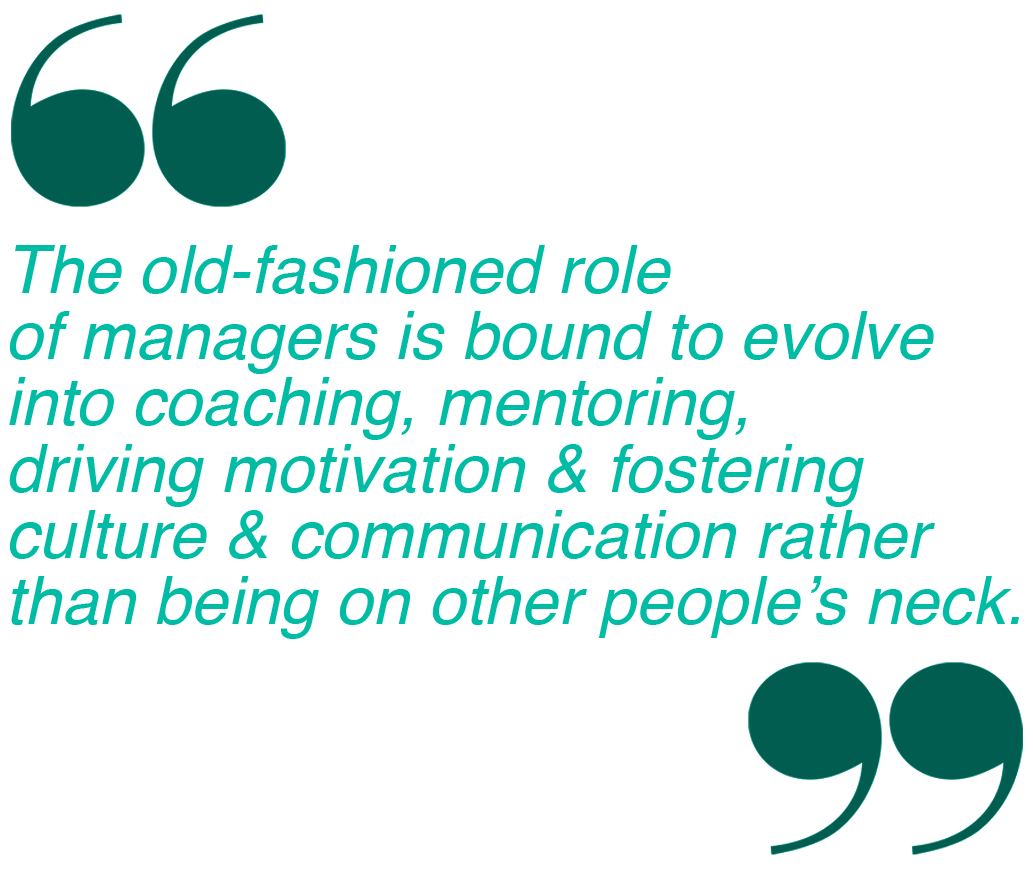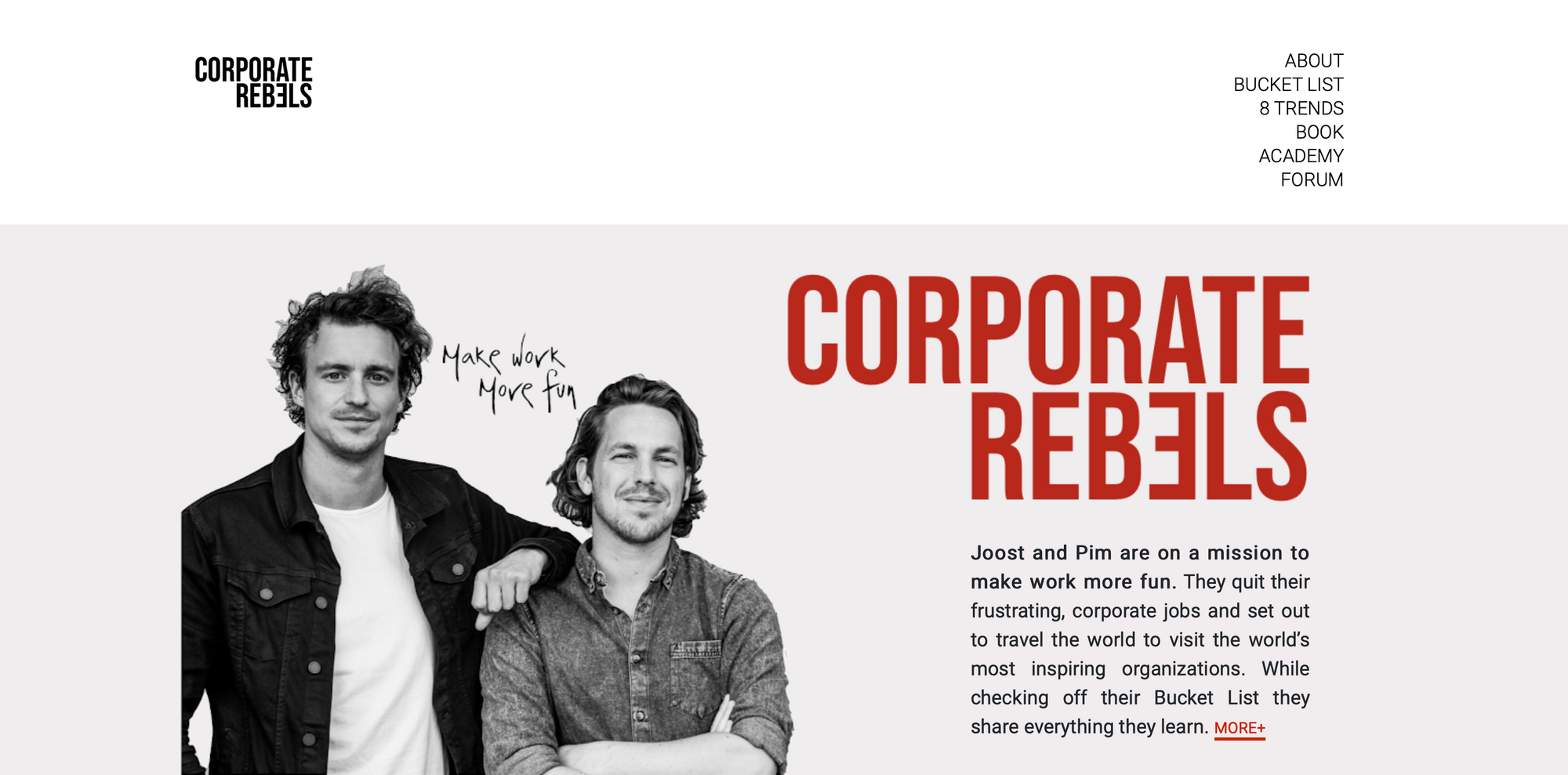WHY THE FUTURE OF WORK WILL BE BOSS-FREE
Not everyone is cut out to be a people manager. But even ‘good bosses’ have their limits.
The traditional pyramidal organizational structure, which has been relied upon since the early 20th century, has become inefficient. The world today is very complex, and complexity is only bound to increase. Pyramidal organizations are slow and frustrating. And younger generations want flat structures.
Drawing from her personal experience as corporate leader, in this article Germana Barba discusses the future of work and why, for organizations to become human, hierarchy needs to go.

I am often asked why I left a rewarding corporate life to jump into the unknown territory of becoming independent. The CEO of my former company was heard, more than once, saying that “people join an organization, but they leave a boss” – how right he was. That was a good guess for what would happen to me and was clearly informed by many other cases before mine - which is why good leadership is so critical to retain talents in an organization.
In a video chat with Jeff Gothelf (author of the book Forever Employable), Michael Bungay Stanier, author of the best-seller The Coaching Habit, candidly admits that when he was a company employee, he was generally liked by his peers and those working for him but not by his supervisors.
On the surface, I was luckier than him. Most of my bosses liked me. I am hard-working, thorough, and highly result-driven. Since my area of expertise – public and government affairs – relies on the ability to deal with people, I used to make a point about my boss being one of my crucial stakeholders: if I could not move him/her to my side, how could I claim to be skilled?
Until the day came when I had a boss I could not handle. It was a number of things - I felt I wasn’t getting the right attention when urgent decisions on my areas needed to be made, my judgment on various business issues was questioned, and I was never sure whether the scope of my job was fully appreciated. I lost motivation. I felt powerless and guilty at the same time. The hard work and the pressure were still there, but the fun was gone. Sound familiar?
Some years ago, I had experienced a diametrically opposed situation.
In 2012, I was asked to coordinate the preparation of the Master Plan to launch the first technology-based product my former company developed. Among other challenging things, I had to manage a monthly meeting among the most senior people in the company (including the CEO) to report on progress. A new General Counsel had just joined the company. He took me ‘under his wing’ and helped me through the process. He validated (or challenged) my approach and even liaised with a few key senior people ahead of each meeting to ensure that their expectations would be met. Basically, he acted as the mentor anybody would dream of. While helping me, he quickly gained a reputation in his own department of being someone very difficult. The same guy that was easing the success of my project was being someone else’s nightmare. By the time I delivered the Master Plan, he was gone. Talking to a colleague about him later on, he said to me: “He was good to you because he wasn’t your boss”.
Clearly, not everyone is cut out to manage people. Some managers are utterly brilliant in their field of expertise, but they don’t enjoy having the responsibility for other people. Some will not be good bosses to you, but they will to someone else. Every relationship is a unique, irreplicable phenomenon between two people, and work relationships are no exception.
Yet having a good boss has its limits too. Good bosses give you strength and confidence; they make you feel accepted and appreciated. But they also may happen to numb your judgment, make you a workaholic, or end up being more present in your life than the people you love. On the other hand, ‘bad bosses’ push you to the limits, test your resilience, and ultimately force you to confront yourself to your real wants and needs. To whom you really are. While I owe my ‘good bosses’ the growth I enjoyed along the corporate ladder, some of the more negative experiences made me grow as a professional and a person and ultimately pushed me to move on. A decision that (if I am lucky) I will never regret.
But the real question is: do people need a boss in order for their organization to function?
With administrative tasks becoming more and more automated, technology providing communication platforms that disregard hierarchies, flexible work arrangements that no longer assume physical presence (and therefore control), and many other ongoing changes, the old-fashioned role of managers is bound to change. This transforms them into coaches and mentors, busy with orienting employees, driving motivation and fostering culture and communication rather than being on other people’s neck. Greater ‘project-based’ work means employees can have different roles on different projects instead of a fixed, level-based job title.
After reading the latest organizational design blogs and book titles, I found that the keyword is “human”. "The concept of organizations seen as living organisms and not as machinery, is finally becoming widely accepted. Rethinking hierarchies is part of this revolution. The key is to think of Leadership as the defining element to intentionally design the best model for each organization. Human centric and purpose oriented,” says Sergio Caredda, Organization Design expert.
The fault is not all on the manager’s side. When people join a company, they need to be guided in order to perform at their best. They need to understand the business and the organization’s culture, and rapidly learn how to access information and opportunities such as cross-functional projects, assignments, and training. They need someone to go to when they have a problem. It’s not just that people reporting to “bad bosses” will be at a disadvantage, it’s also that even the best boss cannot be knowledgeable about every part of the business or of the organization, nor have the time to deal with everything. They are as bound by human limitations as regular employees.
However, radically new organizational models do exist. In 2016, Joost Minnaar and Pim de Morree left their jobs and founded Corporate Rebels, a movement that seeks to identify organizations that have implemented alternative ways of working – with Corporate Rebels’ hashtag (and motto) being #MakeWorkMoreFun. One such company is Buurtzorg, a Netherlands-based, fifteen-thousand-employee, fully self-managed home-care organization with just two line-managers and a staff group of just over one hundred individuals. The company has been voted Dutch Employer of the Year five times. Minnaar and de Morree found dozens of other organizations with similar stories

In the words of Gary Hamel, named by Forbes as "the world's leading expert on business strategy”, “There’s no way to build a human-centric organization without flattening the pyramid”. The future of work looks more flexible and (almost) hierarchy-free. I’d bet that, as a result, more happiness will flow around.
This article was originally published on www.germanabarba.com/myviews



